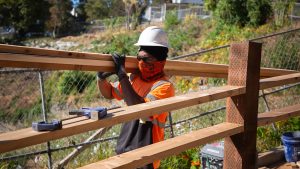News of the legalization of cannabis officially taking effect across Canada in the fall has some industry stakeholders questioning how it will impact jobsite safety, and others stating it may be a good thing for the industry.
Bill C-45, the Cannabis Act, received royal assent on June 21, with Prime Minister Justin Trudeau announcing a day earlier that Oct. 17 will be the date marijuana will be legal across the country. The date was pushed back from mid-September in order to give the provinces and territories more time to implement their regulations.
“It’s a significant step in the wrong direction,” said Sean Reid, vice-president of member relations for the Progressive Contractors Association of Canada.
“We’ve known it was coming for a while but it’s not good news for our industry and for the safety of our workers. Employers and labour have been making unprecedented efforts to improve workplace safety in Ontario and across the country in the last few years and now, with the stroke of a pen, the federal government has inserted a whole new challenge for our industry to deal with. It’s very much undermined the effort that industry has been making to create safe work environments for our people.”
The act creates a legal and regulatory framework for controlling the production, distribution, sale and possession of cannabis, states a release from Health Canada.
“There is still a significant amount of confusion among employers and employees about when they can use it, when they can’t, what are the consequences of improper or unsafe use of cannabis in the workplace. Overall it’s just sending a really bad message to the workplace about the appropriateness of using cannabis,” Reid noted.
In an email to the Daily Commercial News, Ian DeWaard, provincial director, for the Christian Labourers Association of Canada, said safety is a priority and the association is working with members and employer partners to ensure policies are in place to protect workers.
“We expect that the legalization of marijuana will have minimal impact on construction workplaces because most workers are aware that, like alcohol, impairment due to cannabis or use at work will result in immediate and potentially permanent removal from the worksite,” said DeWaard. “We are concerned that there will be some disputes at the outset since testing for cannabis impairment is still not reliable, and because workplace laws about the kinds of permissible drug testing are still unclear.”
Patrick Dillon, business manager for the Provincial Building and Construction Trades Council of Ontario, is hopeful the legalization will help start a conversation around the use of drugs in the industry.
“Once you get past the mental block that some people in our society seem to have about it, it will be a good thing in a number of respects,” explained Dillon. “In our industry, from a workplace perspective, we have never really had serious, proactive discussions around opioids and there is a real problem. I think the legalization of cannabis will start to put a dent in the use of more addictive opioids.”
He added, “The fastest growing business in the country will be the cannabis industry and certainly for us that will mean jobs for building facilities.”
The government of Canada has failed to address the impact of recreational marijuana on workplaces,
— Mary Van Buren
Canadian Construction Association
Clive Thurston, president of the Ontario General Contractors Association (OGCA), said he is disappointed the safety issue was not addressed in passing the bill and pointed out there is still no provision recognizing the need and allowance for testing.
“That is a big disappointment and opens up the door to unsafe worksites. It will cause a great problem within our industry on just how we’re going to deal with this going forward without the proper tools,” he said. “Our biggest concerns are lack of planning, lack of controls and naivety to the reality of what we’re dealing with here.”
The OGCA’s board unanimously voted to continue to lobby for random testing on worksites, he said.
“We’re not trying to say people can’t have their dope but not on our construction sites,” said Thurston. “We will continue to lobby government to help us get the act changed so that construction sites can be protected properly.”
Mary Van Buren, president of the Canadian Construction Association (CCA), said the association will continue to work with the government to ensure workplaces are safe.
“With the adoption of the bill, the government of Canada has failed to address the impact of recreational marijuana on workplaces and, as you know, we’ve been really concerned with the safety implications of this. We feel that this could impact not only the workers and employers but the public at large so we are very disappointed that the federal leadership on this issue was missing,” said Van Buren.
“The employer has an obligation to make sure workplaces are safe and their tools are now limited. The government did not include the ability for employers to do random drug testing and there are no fit for duty standards so the workplace will be confusing for employers as to what their rights are.”
Gilbert Brulotte, who was the lead spokesperson for the CCA on the cannabis file when he was chair, agreed it was disappointing there was no requirement for random impairment testing, not just for cannabis, he noted, but for other substances as well.
“Our debate was providing much needed additional tools to give us the best chance as employers to execute our legal obligation of ensuring our worksites are as safe as possible,” he explained.
“When you talk about worker impairment and giving us the tool of random testing it’s a hot potato, because on one side they’ve got employers on the other side you’ve got the union saying it will infringe on employee and human rights but at the same time they are concerned about safety. There are all kinds of restrictions within society that I could argue impede on my freedom but at the end of the day, those rules…are there to protect the public, so the public good trumps my desire to do what I please.”











Recent Comments
comments for this post are closed